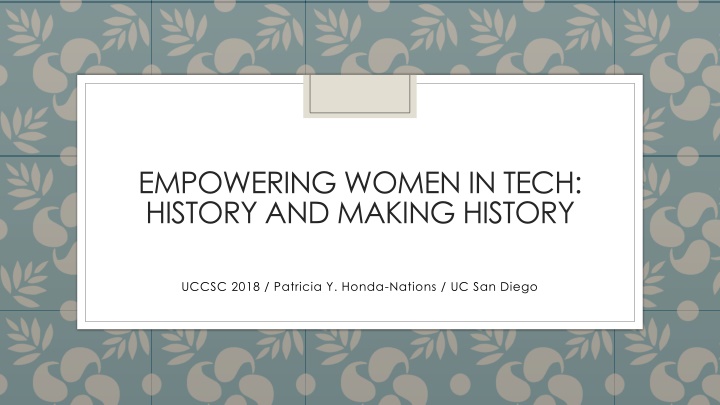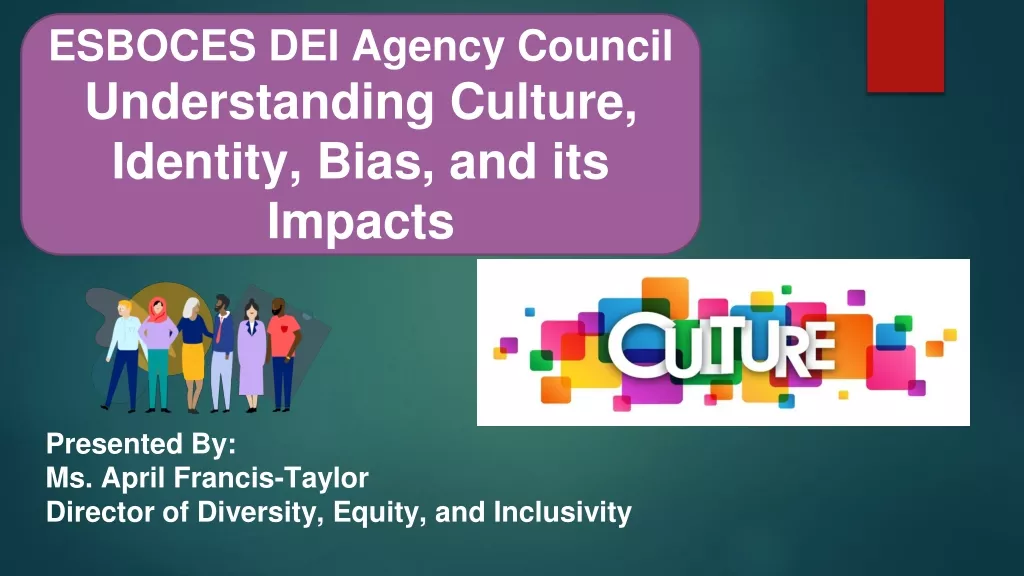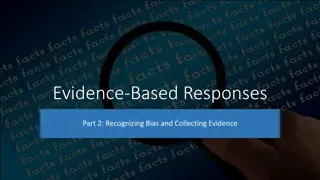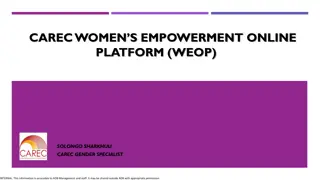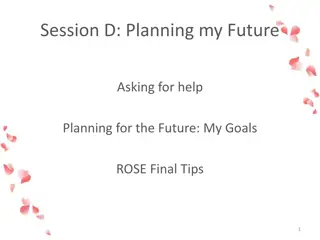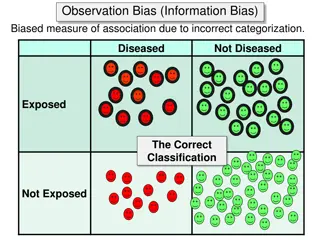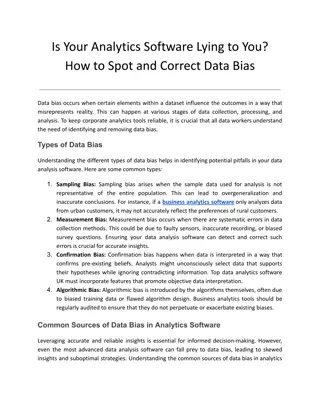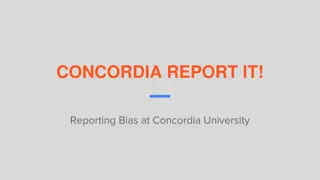Women Empowerment in Tech: Overcoming Bias and Building Inclusive Environments
The history and current efforts in empowering women in tech are highlighted through examples from UC San Diego, Harvey Mudd College, and Carnegie Mellon University. Challenges like unconscious bias and self-underestimation are addressed, showcasing initiatives that have led to increased female representation in computer science. Strategies such as creating supportive environments and professional organizations have proven effective in bridging the gender gap in tech education and professions.
Download Presentation

Please find below an Image/Link to download the presentation.
The content on the website is provided AS IS for your information and personal use only. It may not be sold, licensed, or shared on other websites without obtaining consent from the author.If you encounter any issues during the download, it is possible that the publisher has removed the file from their server.
You are allowed to download the files provided on this website for personal or commercial use, subject to the condition that they are used lawfully. All files are the property of their respective owners.
The content on the website is provided AS IS for your information and personal use only. It may not be sold, licensed, or shared on other websites without obtaining consent from the author.
E N D
Presentation Transcript
EMPOWERING WOMEN IN TECH: HISTORY AND MAKING HISTORY UCCSC 2018 / Patricia Y. Honda-Nations / UC San Diego
Two points I want to focus on Unconscious bias is real . And what do we do about it? Women generally underestimate themselves. So why don t we assume that a woman may be more qualified than we initially think?
THOSE (POSSIBLY NOT SO) CRAZY COLLEGE YEARS
Decline in number of female computer science majors in the 1984-1985 academic year women accounted for nearly 37% of all computer science undergraduate students .As of 2010-2011, women made up just 17.6% of computer science students . This is evident in the workplace: the percentage of women working in computer science-related professions has steadily declined since the 1990s, dropping from 35% to 25% in the last 15 years .
In contrast, Harvey Mudd College as an outlier From an article in Quartz dated 8/22/2016: Nationally, about 16% of undergraduate computer-science majors are women. At Harvey Mudd, that figure is 55%. (It falls to 49% when joint majors are included.) To make everyone feel at ease, professors urge know-it-all students who always have their hand in the air to talk during office hours, instead of in class. Too often, people with experience are taking up all the air time, [Maria] Klawe [the university President] says .
Quote from a female Mudd student For me in high school, if I got something wrong, I felt it would be more of a reflection on women in the class, she [a female Mudd student] says. When I got to Mudd, it was nice to see not just women, but women at the top of the class, women in the middle, and women at the bottom. At Mudd, I felt average, and Mudd gives you space to feel average. Mudd changed the curriculum to have three tracks for introduction to computer programming one for students who have never previously coded. This meant that students who had never coded are not immediately intimidated.
Carnegie Mellon University as another example In 1994, women were 12% of computer science majors. In 2016, they were 49%. (Geek, p. 181). One big change is that they created a Women@SCS (women at School of Computer Science) a professional organization for women students to meet other women, network, volunteer in the community.
What can we do? If our jobs involve interaction with students, offer encouragement. Be visible. All things being equal, try to hire some female student workers as well as male students women also need job experience. Men need to see women performing as peers. In Lean In, Sheryl Sandberg offers the quote that men are promoted based on potential, while women are promoted based on past accomplishments. One way we have interviewed for students, is to show them a box of computer items and ask them to identify them; we wanted to get a base level of competence or experience. Is this a fair test? Or are we not evaluating potential? Do we have unconscious bias in hiring student workers? Depending on the jobs (a lot of our jobs involve support and we seem to find more male students with experience than female). But do they have the potential to learn what to do? Can they bring other things to the table (e.g., once they learn the product, can they help the users in a friendly and professional way?).
Interruptions Studies have shown that men interrupt more than women do in meetings, and that women are interrupted more than men in meetings. Women who have advanced in technology have learned to interrupt. And it s not just in meetings . Do we also interrupt people at work? We interrupt women more than men. (Heck, my husband can be working at home and my daughter will be home and will text me for advice on how to cook lunch because he s working. And I m enabling her because I will tell her that I m working but I will still answer her. ) If you have a choice of asking a question of two colleagues, a man or a woman, doing the same job, who do you go to?
Meetings People often don t give women credit for the ideas they have . Say something like, I like the way you agreed with ___ for her point earlier Call on someone who reports well first to set the example. Then call on one of the newer/younger/less experienced workers. Disrupt the way you normally run the meeting. If you are doing status updates and you notice that people give their status and tune out everyone else, then you have a problem. Call on people out of order, randomly, to keep them engaged. If you have someone who dominates the conversation excessively, politely steer them back on course and give them a way to finish up and don t call on them first. If it s not your meeting, try to help others if they get interrupted. Speak up. Try to keep the amount of air time fair.
Damned if we do Are doers thought to be less creative? If a woman is a reliable worker, does that imply not creative or cutting edge ? Many working women juggle family responsibilities as well as the job. It s important to work steadily, meet deadlines, and still leave on time. But when you see a woman who meets deadlines without doing overtime and a man who meets deadlines by dramatically staying late do you assume that he is working harder?
And damned if we dont! Are the women in your group getting equal opportunities to learn new technologies? Women are socialized to be responsible which can lead to a problem scenario: there is an opportunity to adopt a new platform or product, which involves a different language or technology. If you ask a woman if she wants to take a class or train or attend meetings about it, she may hesitate for a second not because she does not want to learn whatever it is, but because she may be considering her current work load and responsibilities to clients and wants to make sure she has the band width. Before that second has passed, a male colleague may have already volunteered. He may not have been with the group as long (and therefore, has fewer commitments) but he gets to leapfrog over the woman colleague in training.
CAREER, PROMOTION AND SELF-PROMOTION
Working within and against the dominant paradigm Geek Girl Rising: Inside the Sisterhood Shaking Up Tech is a book that came out last year. The focus of the book is on women-run tech companies, women-led startups, women entrepreneurs (very inspirational if you have aspirations outside the university). The book discusses code camps for girls, women venture capital groups, women leading sessions to empower other women to navigate the world of entrepreneurship or career advancement. But this is a big issue that we need to think about: I am interested in fixing the ecosystem, Sharon [Vosmek, CEO of Astia, an angel network and fund] said. Every time we focus the effort on women, we try and change how women behave so it can fit within a male paradigm. That doesn t get us any closer to changing what needs to change, which is the paradigm (p. 126).
Cybersecurity as a career In the July/August 2018 issue of SC Magazine: women are 20% of the global cybersecurity workforce, up from 11% in 2013. 48% of the women have less than 3 years experience. In the US, the number is around 11%. To get more diversity in cybersecurity, Stop requiring five years of experience. Seek other milestones. By now, all of the candidates with that much experience are working in the field, says Kathie Miley, chief operating officer (COO) of Cybrary .
Pay Gaps From an LA Times article from March, 2016: The report, based on 534,000 anonymously shared employee salaries, found that the largest pay gap adjusted for experience, education, position, location, and industry existed among certain types of computer programmers, with men making on average 28.3% more than their female counterparts. Among programmers, scientific and mainframe computer coders saw the greatest disparity. Significant gaps also existed in tech jobs such as video game artists (15.8%), information security specialists (14.7%) and front-end engineers (9.7%).
Getting to the next level In an article that came out this year, [CNET] cited a survey by HackerRank where Despite the fact that the number of female software developers is growing, women still face major setbacks. Those who are over 35 are three-and-half times more likely to hold junior positions, despite being equally capable as their male peers, the survey states. Women apply for a job if they have 90% of the qualifications; men do if they meet 40%. What to do? If you are interested in the next job, apply. If you know someone who would be good at a job, encourage.
Unconscious bias and where it leads. One example to show that how you phrase things really does matter Most people who have worked in the computer industry outside of academia realize that programmers often have periods of nights or weekends or extended hours usually near a code release deadline. The university may have an obligation to disclose extra hours within the job description. However, the way it is described can give a clear message of family-friendly (i.e., women may apply) versus not .
From three postings for IT management positions at the same UC campus
Some other IT management postings from other UC campuses UCLA, Berkeley, Davis no mention of overtime or weekends One ad from Davis did mention this: At UCSF: IT Disaster Recovery & Business Continuity Program Manager In the posting, the regular work load is M-F 8-5 but they don t mention extended hours although I would guess that if there were a disaster, the manager could probably come in!
And how about you? Let s open the discussion to situations that you have encountered and measures you have taken. Let s brainstorm. How could or should things be handled? What can all of us do?
THANK YOU FOR COMING, LISTENING, PARTICIPATING, AND CARING.
References Al-Heeti, Abrar, Young women dominate in software but still face setbacks says hackerrank , CNET News online, March 1, 2018. https://www.cnet.com/news/young-women-dominate-in- software-but-still-face-setbacks-says-hackerrank/ Cabot, Heather and Amantha Walravens, Geek Girls Rising: Inside the Sisterhood Shaking Up Tech. New York: St Martin s Press, 2017. Hughes, Matthew, Exclusive research shows many women developers stuck in junior level roles in The Next Web online magazine, March 1, 2018. https://thenextweb.com/dd/2018/03/01/exclusive-research-shows-many-women-developers- stuck-junior-level-roles/ Lien, Tracy, Women in tech still earn far less than men, Los Angeles Times, March 23, 2016. http://www.latimes.com/business/technology/la-fi-tn-0323-pay-gap-20160323-story.html Sandberg, Sheryl. Lean In: Women, Work and the Will to Lead. New York: Knopf, 2013. SC Magazine: The CyberSecurity Source, July/August 2018. https://media.scmagazine.com/documents/344/070818_onlinesc_85787.pdf
Snyder, Kieran. How to get along as a woman in tech: Interrupt men. Slate magazine, July 23, 2014. http://www.slate.com/blogs/lexicon_valley/2014/07/23/study_men_interrupt_women_more_in _tech_workplaces_but_high_ranking_women.html Staley, Oliver, Harvey Mudd College Took On Gender Bias and Now More than Half Of its Computer Science Majors are Women , Quartz magazine online, August 22, 2016. https://qz.com/730290/harvey-mudd-college-took-on-gender-bias-and-now-more-than-half- its-computer-science-majors-are-women/ Stillman, Jessica, What Counts as a Rude Interruption Depends on Your Gender, Study Confirms , INC magazine, July 25, 2018. https://www.inc.com/jessica-stillman/what-counts-as- a-rude-interruption-depends-on-your-gender-study-confirms.html?cid=hmhero What s the Gender Pay Gap in Engineering? Society of Women Engineers Blog, April 20, 2018. https://alltogether.swe.org/2018/04/pay-gap-in-engineering/ Women in Computer Science: Getting involved in STEM, Computer Science org website, https://www.computerscience.org/resources/women-in-computer-science/. Women in Tech: Women in advanced computing, lecture by Nicole Forsgren Velasquez during the Campus LISA conference on July 9, 2014 at UC San Diego. https://cloud.sdsc.edu/v1/AUTH_sysadmin-l/CampusLISA%202014%20videos/20140709- CampusLISA-WIAC.mp4 Yagoda, Ben, The Cognitive Biases Tricking Your Brain, The Atlantic Magazine, September 2018. https://www.theatlantic.com/magazine/archive/2018/09/cognitive- bias/565775/#nws=mcnewsletter
Patricia Y. Honda-Nations Information Technology Services UC San Diego Email: pnations@ucsd.edu
